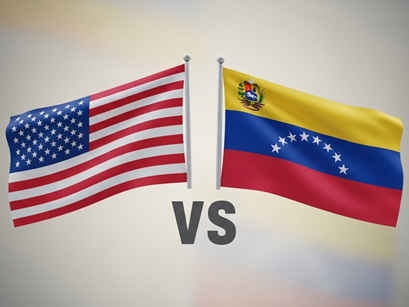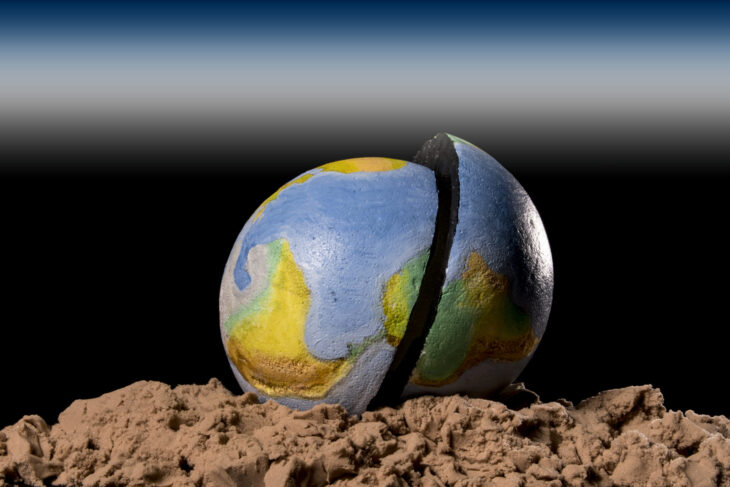
Over the past month, the United States has ratcheted up its campaign against Venezuela and its ruling PSUV. Following the increase in the bounty offered by the US for the arrest of Venezuelan President Nicolas Maduro, US President Donald Trump announced that he had ordered a detachment of naval vessels, including a nuclear-powered submarine, to the South Caribbean to do what he called anti-drug operations. The operations, he stated, were to stem the alleged drug flow coming from Venezuela to the US.
Now, this is a pack of lies. Talk about Venezuela being a transshipment hub for drugs entering either Europe or the US is patently false. According to the United Nations and the US Drug Enforcement Agency, Venezuela accounts for a fraction of the drugs entering the US, and the drugs that do come from Venezuela come from or are handled by Colombian right-wing militias who operate in the border area.
In order to facilitate this troop movement, the US laid the groundwork earlier in the year when the second Trump Administration began by labelling the gang Tren de Aragua as a major narco-trafficking terrorist gang which operated freely in Venezuela and needed to be dismantled. Then came the allegation that President Maduro was a drug trafficker and a member of the fictional gang Cartel of the Suns. There is no record in either the United Nations or the DEA referring to this gang, which, we are told, is not new, so we can assume it was all made up.
For those who are not naive, or have not bought the US propaganda hook, line, and sinker, we can see that the allegations of drug trafficking make no sense. Colombia remains a drug hotspot, Ecuador’s president is credibly linked to drug traffickers, as are other countries in South America, yet it is Venezuela that the US singles out. The question I hear some ask is why are they doing this?
The US has had a long and inglorious history of meddling in Venezuelan affairs, something which has increased since the Bolivarian revolution of 1998 and the election of its leader, Hugo Chavez. In 2002, the US, under the leadership of GW Bush, coordinated a coup with elements of the Venezuelan army to overthrow the left-wing president. The coup was unsuccessful, but during the brief period when Chavez was ousted, the US gave recognition to the man installed by the army as his replacement.
Following the failed coup, the US sought to destabilise the Venezuelan oil sector by instigating a general strike among workers at PDVSA, hoping to cripple the country, which is dependent on oil. The oil sector rebellion was overcome, and the riches from PDVSA were used to increase the living standards of Venezuelans as opposed to lining the pockets of US oil companies.
Following the tragic death of Chavez, a death many in Venezuela don’t believe was natural, President Maduro took over after winning elections. It was at this time that the US, under Barack Obama, increased the pressure on Venezuela by labelling the country as a national security threat and levied sanctions on individuals and companies. Pressure was then further increased by the US, under Trump, and the EU, not recognising the results of the 2018 elections and recognising Juan Guido as “interim” president, further sanctioning Maduro and his Government. The US further increased pressure by orchestrating violent protests within Venezuela by opposition forces, a failed mercenary invasion, an assassination attempt against Maduro, and seizing Venezuelan assets in the US and across the globe.
The attacks on Venezuela are, if we are honest, taking place for the very reason Cuba has been under attack for over 60 years. Venezuela, like Cuba, represents the threat of a good example; it threatens to show that Latin American and Caribbean countries are compatible with socialism. It is to erase the vestiges of independence in the region and have it firmly under US hegemony. Put another way, Venezuela is attacked because it is living proof that another way is possible beyond capitalism and imperialism.
Venezuela, in the eyes of the US, must be stopped because it is an internationalist country that does not believe that the benefits of the country must remain with it, as seen with PetroCaribe, where its oil wealth was shared with the region. Venezuela, in the eyes of the US, must be stopped because it has been and continues to strive for a multipolar world with institutions such as CELAC and ALBA replacing outdated imperialist organisations such as the OAS.
Venezuela, Nicaragua, and Cuba are the three countries in the region that are actively showing us that another way is possible. It is not an easy way, one fraught with challenges, but it is exciting and indigenous, something which cannot be said of the capitalism foisted upon the rest of us by the US. Venezuela, in the eyes of the US, must be stopped, as the last 20 years have shown us, and Washington will literally stop at nothing as it seeks to both roll back socialism in the region and seize the Venezuelan oil, which has been offline to the US for some time.
The military build-up in the region has already led to bloodshed. This month, the US attacked an unidentified ship, which it claimed was running drugs, with missiles, killing all 11 occupants on board. On September 12, the US, in its attempt to intimidate Venezuela, detained fishermen who were operating in Venezuelan waters. These activities represent open season for military activity in the region, one which we thought was behind us after the 2014 CELAC meeting, which declared the region a zone of peace.
Why do i say open season? The actions against the “terrorists” will not stop in international waters, especially after Trinidad and Tobago expressed vocal support for these actions. With drug runners labelled as terrorists, and the region awash with these gangs, it is not a leap in logic to say that these actions could take place against, say, the Clansman gang in Spanish Town. Imagine for a minute a Reaper drone bombing the Clansman hideout, imagine the collateral damage, people living next door, working in the community, or simply passing by. This is what we have welcomed to the region, and as much as I dislike the gangs, I do not support killing them and others with these weapons of war, especially by foreigners.
Open season because this action will lead to US threats, at the diplomatic level, of these types of actions on the soil of various regional countries if they do not agree 100 per cent to US dictates, because we all, by and large, have violent drug-dealing gangs in our nations. The fact that CARICOM hasn’t come out and publicly condemned this action shows how weak regional leaders are at the moment, and just how divided CARICOM has become, with Trinidad and Jamaica acting as the Trojan horse for the US.
The region and all its institutions must come out and condemn these actions. We must say that kidnapping of people is not okay, we must come out and say that extrajudicial killings are not okay, and that we, as a region, may be poor, but we are sovereign and won’t stand for it. We must either stand united on this issue and take whatever blow comes collectively, or be beaten into submission alone, be slaves to an empire alone, and die by our lonesome
There is little historical precedent for small nations surviving against a regional hegemon; there are plenty of records of small nations uniting to fend off a hegemon and maintain their independence. I fear that by remaining silent on this, as Jamaica has, or praising it as Trinidad has, puts the region and the individual nations’ very independence at risk. As seen with Greenland, the US has interests in expansionism, and securing the sea lanes that are the Greater Antilles is not off the question. This does not have to be by force and open colonisation, we could easily become a fully-fledged neo-colony if the US threatens to hit our “terrorists” with drone missiles.
For the past 20 years, the US has mostly paid little attention to the region, instead focusing on affairs further afield. This is changing now. As the US retrenches from the rest of the world, it is seeking to double down in this region, expel China, and bolster the far right. This is just the opening shot in their attempt to return the region to the days of the early 1900s, when we were open pawns in the game of regional hegemony, which then became global hegemony.
The situation has since inched closer to becoming a regional crisis as the US engaged in the kidnapping of Venezuelan fishermen, along with two drone strikes, extrajudicially killing alleged drug dealers in the Southern Caribbean.
We cannot allow this and must stop it. The left has made many advances across the region over the last 20 years, lifting millions out of poverty and we cannot allow those to be put at risk by a fading superpower. We must all — pan-Africanists, leftists, nationalists, and progressives — come out and condemn the build-up in the region and the proposed assault against Venezuela. If they fall, others will be next and we will, at that point, have no one to stand up for us.



